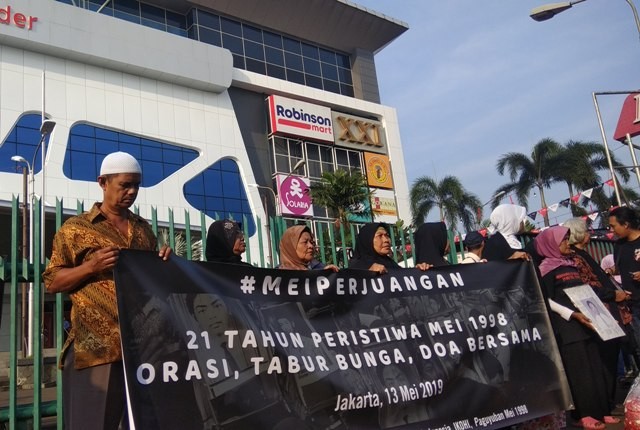"Our view is that (the law enforcement of human rights violations) tends to go backwards," said Member of the KontraS Impunity Monitoring Division Ahmad Sajali, to Medcom.id, Thursday, May 18, 2023.
He explained that actually there were efforts to uphold the law through a human rights court, such as the Paniai incident. After the results at the first level, there are signs or tendencies that the Attorney General's Office as the state's attorney is still very weak in the process of preparing indictments.
Only, there was one defendant who was brought to court for the Paniai incident and in his indictment it appears that the victim was not given access to testimony. Then, there is no participation or combination of efforts to claim compensation or restitution as a form of recovery in the indictment and prosecution process.
Victims, he continued, were also stigmatized in various legal documents carried out by the Attorney General's Office. In fact, the Attorney General's Office should defend the interests of victims as a representative of the state to collect facts and so on in order to strengthen the prosecution process.
"Yes, we both know that the end result is that a defendant is acquitted in this incident," he said.
He explained another form of setback, the Coordinating Minister for Politics, Law and Security (Menko Polhukam), Mahfud MD, who repeatedly mentioned a wrong concept of legal settlement for gross human rights violations. It was as if the ball was being thrown at the DPR, even though through a decision, the Constitutional Court (MK) had mentioned the process in the DPR after the investigation process by Komnas HAM was completed for 15-17 cases of human rights violations.
"Then during the investigation which stalled, but suddenly the Coordinating Minister for Political, Legal and Security Affairs Mahfud MD immediately pushed the ball towards the DPR. So it was as if he was running away from responsibility. In fact, it was stuck at the Attorney General's Office, like that," he explained.
According to him, this should be the authority or evaluation of the government, including President Joko Widodo and Coordinating Minister for Political, Legal and Security Affairs Mahfud MD.
"This seems to be the DPR's fault in the legislative realm. There is also a recommendation from the DPR for a human rights court in the case of the enforced disappearance and kidnapping of 97-98 activists, after all there was no ad hoc court decree issued by President Jokowi. law enforcement," he said.
On that basis, he believes the trial of the Paniai case was only to wash President Jokowi's hands. This is because the Paniai incident was one of the gross human rights violations that occurred during the Jokowi era or December 2014.
"Even though there was discussion about several serious human rights incidents or not, such as the Kanjuruhan incident, the killing of FPI members, and so on, there were attempts to establish Munir's murder during this period. It is also a challenge and an additional record of how it is related to President Jokowi and the existence of crimes against humanity or violations Human rights are serious," he said.
The State Does Not Intend to Complete
Amnesty International Indonesia Executive Director Usman Hamid said that the government has not made any real efforts to resolve past human rights violations, including the 1998 incident. The government seems reluctant to resolve these human rights incidents."Unrest, looting, and sexual violence are historical memories attached to the May 1998 Tragedy. Unfortunately, to this day, there has been no concrete effort from the state to resolve it," said Usman.
Usman said the 1998 tragedy had a serious impact on the victims and society in general because it claimed more than a thousand lives. Coupled with sexual violence which was mostly directed against Chinese women.
“The findings of the joint fact-finding team at the time showed that this incident occurred in a systematic and planned manner, and the state had also recognized it as a gross human rights violation. But that's not enough. There must be real efforts to thoroughly investigate this tragedy," said Usman.
According to him, the government should pay special attention so that the perpetrators of violence, rape and arson during the riots at that time could be held accountable for their actions. This is because they not only violate the rights to freedom and physical integrity, but also damage the victim's dignity emotionally and psychologically.
The reform era began in 1998, to be precise at the time of the fall of President Soeharto on May 21, 1998. Before Suharto stepped down, there was the Trisakti Tragedy which became the focus of many parties on May 12, 1998.
This incident caused four students to be shot dead and then sparked the May 1998 riots the day after.
In addition, a number of activists, youths and students were kidnapped. Referring to the KontraS report in 2017, nine kidnapping victims have been found. However, 13 other victims are still missing.
On October 1, 2005, Komnas HAM formed an ad hoc team to investigate gross human rights violations during this incident. As a result, Komnas HAM found allegations of gross human rights violations in the 1997-1998 Forced Disappearances. (Kevin Schreiber)
Cek Berita dan Artikel yang lain di Google News



















